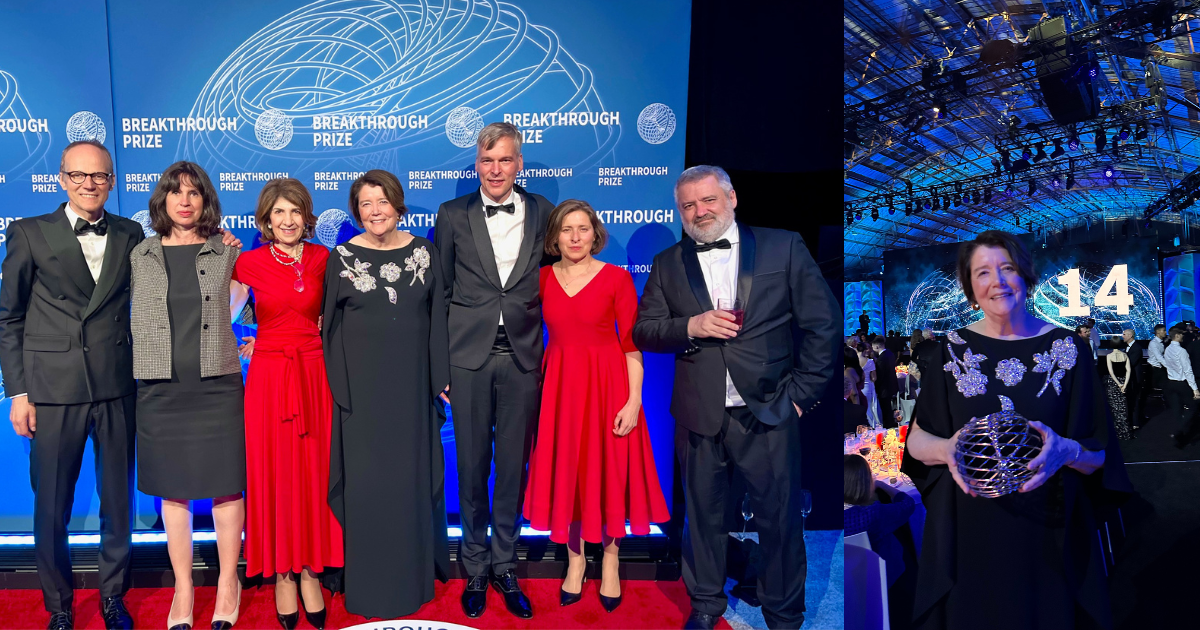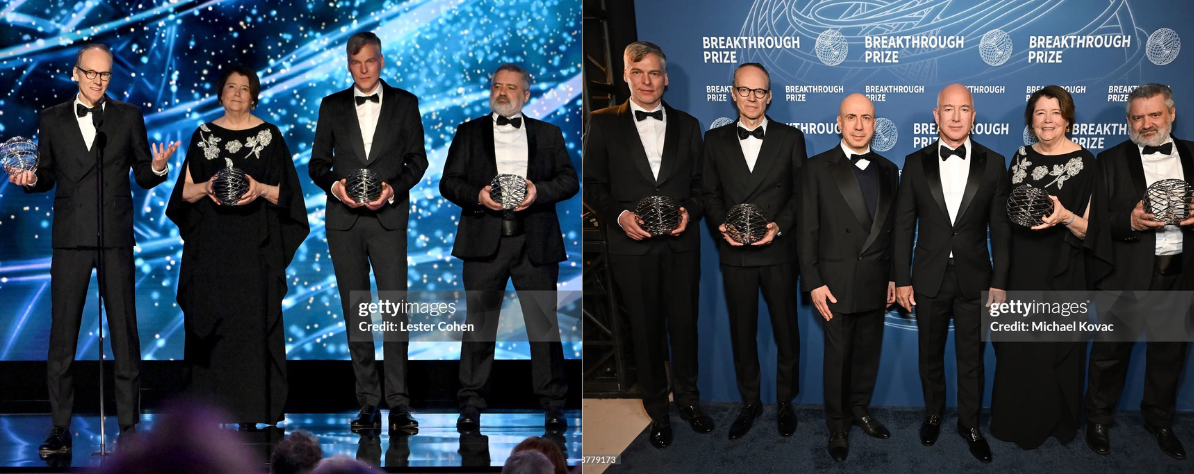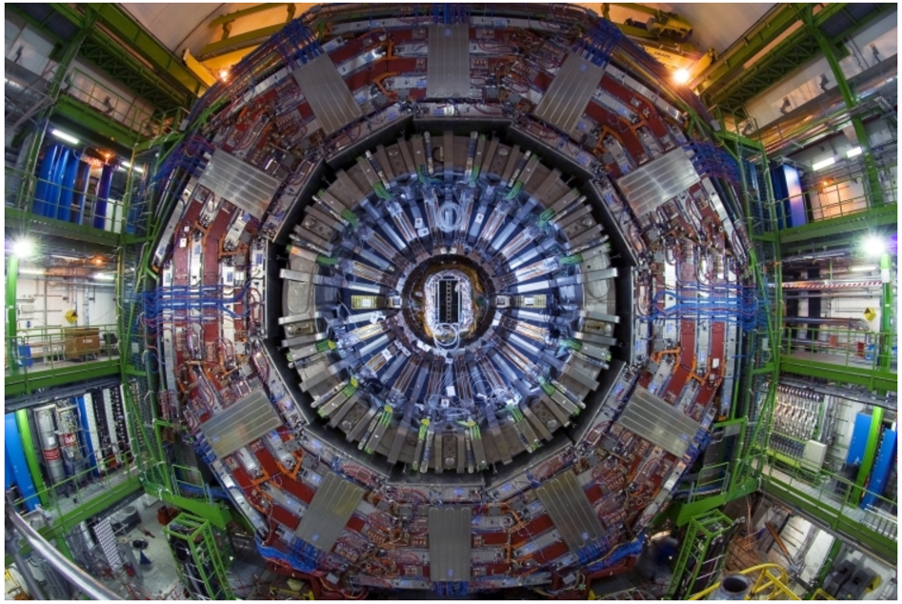
On Saturday 5th April Patty McBride, former CMS Spokesperson, received the 2025 Breakthrough Prize in Fundamental Physics on behalf of the CMS Collaboration. This was a joint award, along with ATLAS, LHCb and ALICE. It was presented to the Spokespersons by Yuri Milner and Jeff Bezos, at an award ceremony in Los Angeles for “detailed measurements of Higgs boson properties confirming the symmetry-breaking mechanism of mass generation, the discovery of new strongly interacting particles, the study of rare processes and matter/antimatter asymmetry, and the exploration of nature at the shortest distances and most extreme conditions at CERN’s Large Hadron Collider”.The $3M prize (CMS share is $1M) will be donated to the CERN and Society Foundation to offer grants to doctoral students from member institutes to spend research time at CERN.
In 2013 the spokespersons of ATLAS and CMS, together with then director of the LHC project Lyn Evans, received a special Breakthrough Prize in recognition of the discovery of the Higgs boson. This new award recognizes that the discovery was just the beginning of an extensive and detailed research program in CMS on the properties of the Higgs boson, as well as a comprehensive range of studies of the electroweak scale and beyond, matter/antimatter asymmetry, and probing the hot, dense state of nuclear matter that prevailed in the early Universe. This has all been accompanied by direct and indirect searches for new phenomena and particles to try to answer some of the most fundamental questions: what is the nature of Dark Matter? Why is there such an extreme imbalance between matter and antimatter in the Universe? Why are some particles more massive than others?

ABOVE: Scenes of the Breakthrough Prize Award Ceremony, Santa Monica, California, 5th of April 2025.
LEFT: Spokes persons for the four LHC experiments with family members, and CERN DG Fabiola Giannotti
RIGHT: Patricia McBride (Fermilab, USA, CMS Spokesperson 2022-2024) with the Breakthrough Prize award. (Photograph by Ana Jovanovic-Hacon)
Patty McBride (Fermilab, USA, CMS Spokesperson 2022-2024) said “It was an honour for me to accept the Breakthrough Prize for Fundamental Physics on behalf of the CMS collaboration, recognising the achievements of everybody involved. Researchers from more than 250 member institutions worldwide have analysed the vast amount of data collected during LHC Run 2 to produce compelling measurements with exquisite precision. Indeed our strength comes from the diversity and expertise of our colleagues from all over the world. The prize also recognises the work of each CMS member who operates and maintains the CMS detector and is working to complete all the compelling detector upgrades for the future. ”.
Along the way CMS collaborators have developed novel techniques for analysing the data from LHC collisions with extraordinary precision, despite the complexity of the collisions being several times higher than CMS was designed for. Examples are the recent measurement of the mass of the W boson and the observation of a quasi-stable state of top-antitop pairs.

ABOVE: Group photographs of some members of the CMS Collaboration throughout Run 2, and the beginning of Run 3 up to 2024. Large photo: 2017, top left: 2024, middle left: 2016, bottom left: 2019, bottom middle: 2022, bottom left: 2023. [M. Hoch, S. Hurst, S. Rodriguez | CERN]
Gautier Hamel de Monchenault (Saclay, France, present CMS Spokesperson) commented on the studies of the Higgs boson “the Higgs boson is unique in that it interacts with all other massive particles – even ones that have not yet been discovered! So studying its properties in minute detail can give us insight into the fundamental nature of our Universe, possibly revealing new phenomena and hinting at as-yet-undiscovered particles.”
And the CMS journey still has a long way to go, with operation foreseen until the early 2040s through an extensive set of upgrades in 2026-2029 in preparation for the High Luminosity phase of the LHC, starting in 2030, where the LHC will collide around 4 times more protons per second than at present.
Gautier concluded: “This Prize is of particular importance to me because, unusually, it does not reward an extraordinary discovery such as that of the Higgs boson, but rather crowns the in-depth work in precision physics, in the detection of rare processes, and in the systematic search for new phenomena, that we have collectively carried out over the past ten years. Particle physics is not just about discovering new particles; it is about challenging the Standard Model in its most subtle predictions, with the common goal of transcending it in order to progress towards a response to the most fundamental questions, such as the nature of dark matter or the cosmic baryon asymmetry. The Prize motivates us even more to analyze the colossal amount of data we have been recording since the start of Run-3 (2022), and to finalize the ambitious upgrade of our detector for the high-luminosity phase of the LHC.”

ABOVE: LHC Experiment Spokes Persons at the Breakthrough Prize award ceremony, Santa Monica, California, 5th of April 2025.
LEFT: Andreas Hoecker (ATLAS), Patricia McBride (CMS), Marco van Leeuwen (ALICE),Vincenzo Vagnoni (LHCb). [Photo by Lester Cohen | Getty Images]
RIGHT: Marco van Leeuwen (ALICE), Andreas Hoecker (ATLAS), Yuri Milner (Milner Foundation), Jeff Bezos, Patricia McBride (CMS), Vincenzo Vagnoni (LHCb). [Photo by Michael Kovac | Getty Images]
Further Links:
The Breakthrough Prize for Fundamental Physics
The Winners
CMS as a winner

